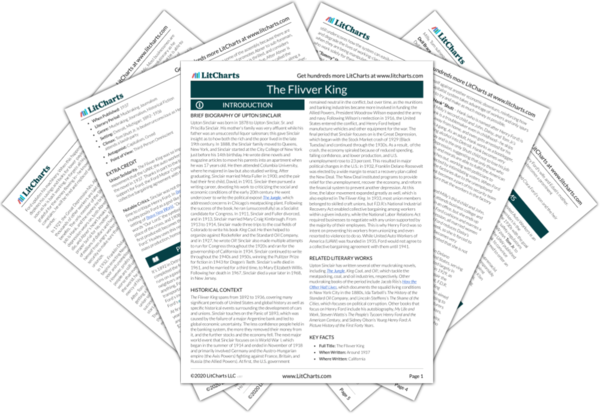The assembly line (or “the belt,” as the workers call it) initially represents the benefit of new technology. Because it allows for a greater division of labor, the belt revolutionizes Ford’s factories. All in all, it allows Ford to reduce the time it takes to assemble a car from 12 hours and 28 minutes to 1 hour and 33 minutes, increasing efficiency and productivity in the plant.
However, the belt also symbolizes the harm of new technology, as well as how unregulated capitalism degrades working conditions. The belt quickly becomes a tool to take advantage of the workers in the factory, squeezing as much productivity out of them as possible. Ford periodically speeds up the assembly line without the workers’ knowledge, causing them to do more work for the same wages. The assembly line becomes so harmful that people are constantly injured on the line—they even have a saying in the factory that one man dies every day. Without safety regulations or union protections, the assembly line enables Ford to take advantage of his workers, thus illustrating how new technology can also have detrimental effects, particularly on working-class people who are defenseless against unjust working conditions.
Assembly Line (or “the Belt”) Quotes in The Flivver King
Never had there been such a device for speeding up labor. You simply moved a switch, and a thousand men jumped more quickly. It was an invisible tax, like the tariff, which the consumer pays without being aware of it. The worker cannot hold a stopwatch, and count the number of cars which come to him in an hour. Even if he learns about it from the man who sets the speed of the belt—again it is like the tariff in that he can do nothing about it. If he is a weakling, there are a dozen strong men waiting outside to take his place. Shut your mouth and do what you’re told!

Unlock explanations and citation info for this and every other The Flivver King quote.
Plus so much more...
Get LitCharts A+With every month of the depression these things had got worse and worse. The twenty-five thousand workers were driven until they went out “punch-drunk.” Sometimes one went out on a stretcher, because men so driven couldn’t handle machinery without accidents. On no subject had Henry written more eloquently than on the importance of safety; but again and again his “safety department” was overruled by his speed-up department, and there was a saying in the plant that it took one life a day. They had their own hospital, and there was no way to get any figures.












